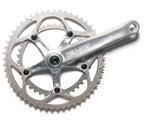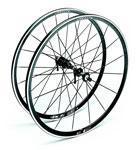Tech news for August 24, 2001By John Stevenson Got tech? Send press releases, news, and tech questions to the Cyclingnews tech-heads. SnippetsShocking news from DTIn one of the more startling bits of product diversification we've seen recently, Swiss spoke and hub manufacturer DT is getting into rear shocks. According to a DT news release the air/oil SSD 210 shock will weigh 209g incl. ball joints and mounting hardware in a 37.5mm travel version with 165mm eye-to-eye dimension. A lockout version will tip the scales at 218g and there will also be a 50mm/190mm version. For comparison, a Fox FLOAT R without mounting hardware weighs 217g. Factor in the 20-30g of bolts needs to attach it to the bike and the DT unit starts looking very attractive to suspended weight-weenies. However, it's slightly puzzling at first glance that DT would want to get into shocks at all, given the existing competition. A source close to the company says DT International Sales manager Daniel Berger was grumbling a couple of years ago about having blown another manufacturer's air shock, and six month's later the SSD was in development… On closer examination, it's not that wacky a move. DT's base in Biel, Switzerland is surrounded by precision manufacturing subcontractors, so getting highly quality sub-components for shocks is not a problem, and the company already has high-quality assembly facilities in place for its Hügi hubs. This is going to be an interesting project. New DT spokes, hubsAlso new from DT are a spoke line, the Super Comp, and the FR hub. Super Comp spokes are 2.0/ 1.7/ 1.8mm in diameter, shaving a little weight and also reducing the biggest hassle of building wheels with butted spokes: wind-up of the midsection from torque on the fatter thread end. Super Comps are intended for "Bikes with Disc Brakes, Downhill, Touring" according to DT, but we can see them getting much wider use. The beefy FR hub is like a toughened-up version of the lightweight 240 series, with steel cassette body and axle ends to withstand mountain bike use. Truvativ on the road
Crank maker Truvativ has announced what we believe are the first road cranks with the ISIS spline that the company was instrumental in developing a couple of years ago. The Elita crank is available in double and triple road variants and a cyclocross double, with a claimed weight of 635g for the double. RRP is US$165 More information: Truvativ's website | |
New from Ritchey
Our favourite big mo and goggles-equipped product designer has a stack of new stuff in the pipe. Highlights include WCS road and Pro cyclocross cranks; a whole new line of tyres, the Vader series; a 5mm wider OCR rim for disc brakes, the Girder and a high-performance wheel pair, the WCS DS (Deep Section), shown left. The mountain bike tyres are a development of Ritchey's classic Vector Force Analysis series and having leapt from Force to Vader Ritchey's Pun Department went into overtime with names like Ele Vader, Exca Vader, Inno Vader and Moto Vader. Ouch. The WCS DS wheels are built from Ritchey hubs, rims and skewers, with bladed but otherwise conventional spokes. Spoke allocation is 16 up front and 20 in the rear. In a final bit of Ritchey news, the company has a greed a licensing deal with Shimano to use SPD pedal technology. More information: Ritchey's website (No 2002 information at present) | |
Giro Pneumo reader feedbackLast week's review of the Giro Pneumo included a request for comments from readers who'd used the helmet in warmer conditions than the chilly weather Sydney is currently enjoying. Steven Yu of Austin Texas had this to say:
Chris Constantino of Boston, MA agrees:
LettersFinally, I couldn't resist stealing this from yesterday's mailbag:
Actually this always seemed to me to be a pretty sensible thing for the UCI to do. The problem with pushing the weight of bikes as low as possible is twofold: cost and safety. The safety issues could be dealt with by a massive, expensive testing and certification bureaucracy, but it's much less hassle to simply say "Lighter than this ye shall not go." Of course it's possible to make a bike at the UCI weight that has some under-designed parts, but a lower weight limits prevents reckless envelope-pushing as far as weight goes. The cost issue has two faces: the UCI seems to be trying to keep pro-quality bikes reasonably affordable so the rest of us can ride them too, and also so that building pro quality bikes does not get so expensive that bike manufacturers stop sponsoring teams. If that sounds unlikely, it's already happening in mountain bike downhill racing, where the cost of developing, equipping and running teams outweighs the marketing return, and has caused at least one bike manufacturer to drop its downhill team. Also, don't forget, the restriction is on the total weight of the bike. There's nothing to stop you buying components with a gram scale and building a 6.5kg bike; you'll just have to stuff a bag of lead shot into the seat post on race day. |

